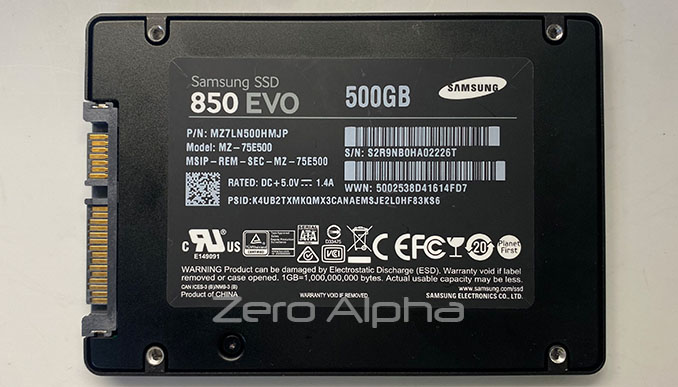Samsung 850 Evo 500gb Data Recovery MZ-75E500
Samsung 850 Evo 500GB (MZ-75E500) data recovery service. These drives can experience issues that compromise data accessibility. Whether due to hardware malfunctions or human error, data loss can be distressing. In this article, we delve into the various problems that can afflict the Samsung 850 Evo 500GB and explore potential data recovery solutions.

Physical Malfunctions
While SSDs are inherently more durable than traditional hard drives, physical issues can still arise. These issues may include connector damage, NAND flash chip failures, or even water or shock damage. Symptoms may range from the drive not being recognized by the system to system crashes and boot failures.
Solution: In cases of physical damage, it's recommended to seek professional help. Data recovery specialists possess the necessary tools and expertise to recover data from damaged drives without exacerbating the problem.
File System Corruption
File system corruption can occur due to sudden power loss, improper ejection, or software bugs. Symptoms include error messages indicating unreadable or corrupted data, failure to access files, and system instability.
Solution: Using data recovery software can sometimes help restore data from a corrupted file system. It's crucial to stop using the drive immediately to prevent further data loss and consult with experts if the situation worsens.
Firmware Issues
Firmware acts as the bridge between hardware and software. A corrupted firmware can lead to read/write errors, slow performance, and even data inaccessibility.
Solution: Upgrading or reinstalling the firmware can sometimes resolve these issues. However, this should be done with caution to avoid further complications. If the firmware fix fails, seeking professional assistance is recommended.
Bad Blocks
Bad blocks are sections of the SSD that become unusable, often due to wear and tear over time. This can lead to data loss and degraded drive performance.
Solution: Some SSD management software offers features to identify and manage bad blocks. Regular backups are also crucial to ensure minimal data loss in the event of bad block issues.
Accidental Deletion or Formatting
Human error is a common factor in data loss. Accidentally deleting files or formatting the drive without proper backup can lead to significant data loss.
Solution: If data has been deleted or the drive has been formatted, stop using the drive immediately to prevent overwriting the data. Utilize data recovery software to attempt to retrieve the lost files. If unsuccessful, data recovery professionals might be able to help.
Encryption and Password-Protected Drives
Encryption adds an extra layer of security to data storage, but it can also complicate data recovery efforts if passwords are lost or forgotten.
Solution: Always keep a secure record of passwords and encryption keys. If access is lost, recovery might be challenging, but data recovery experts may have methods to assist.
Operating System Compatibility Issues
Sometimes, OS updates or changes can lead to compatibility issues with SSDs, resulting in data inaccessibility.
Solution: Ensure that the SSD's firmware and drivers are up to date before making any major OS changes. Back up essential data before updating the OS.
Conclusion
The Samsung 850 Evo 500GB (MZ-75E500) is a commendable SSD known for its performance and durability. However, like all storage devices, it's not impervious to issues that can lead to data loss. Understanding the potential problems, their causes, and the available solutions is essential for safeguarding your valuable data. Whether it's physical damage, firmware issues, or accidental deletion, approaching data recovery systematically and seeking professional help when needed can greatly increase the chances of successful data retrieval. Remember, prevention through regular backups and cautious usage is the best strategy to counter data loss woes.